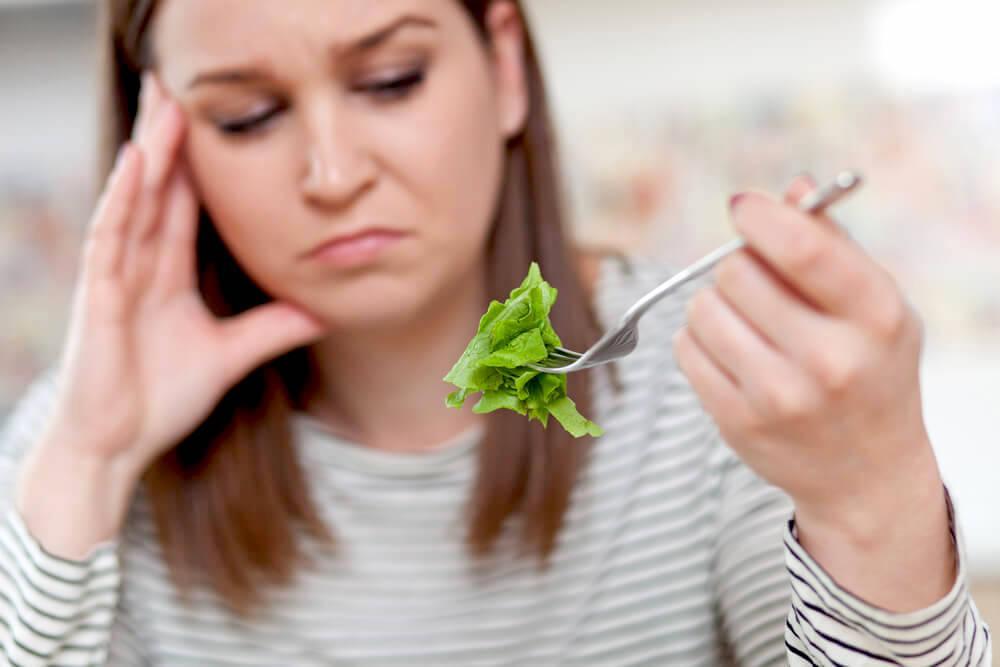Have you ever heard the adage ‘you are what you eat’? Proper nutrition is indeed the cornerstone of excellent health. Apart from keeping you fit and physically appealing, a good diet reduces the risk of getting various chronic diseases.
With the emergence of many nutrition related health conditions, what constitutes to a healthy diet can vary from one individual to another. However, one thing remains apparent; the link between smart diet choices, healthy weight and overall health is too significant to be ignored.
In the quest to be healthy and fit, you may have tried to change your eating habits so many times and are probably wondering why your efforts have not borne any fruit. The question you should rather be asking yourself is whether diet misconceptions are sabotaging your efforts. If you are determined to find out, here are 15 diet mistakes to avoid.
1. Not Eating Enough Fat
Fat is associated with weight gain and eventual obesity. It is therefore deemed as something one should avoid in their diet in order to maintain healthy weight. On the other hand, fats are important components of a healthy diet. They give your body energy, support cell growth, protect your organs and keep your body warm.
While some types of fats can increase the levels of bad cholesterol in your body, others like those found in avocados, olives, peanut butter and almonds are beneficial to your body when consumed in moderation.
Also, beware of processed ‘low-fat’ foods. Some of them are laden with copious amount of sugar to improve their taste. This may work against you.
2. Relying on Crash Diets
If anybody told you to take cabbage soup for a week, run! The diet will come back to haunt you. A crash diet may drastically melt down your body fat but meanwhile, 3 things are likely to be happening to your body in the process:
- The reduced calorie intake slows down your body’s metabolism which may extend even after the dieting period.
- Lack of enough calories denies your body the energy to work out and makes you always hungry. This increases your chances of binging on unhealthy comfort foods.
- A low-calorie diet is linked to increased stress levels. This triggers excess production of stress hormone cortisol. Elevated cortisol level is not your friend when you are trying to lose weight; it is linked to weight gain especially around the abdomen.
On average, you need about 2500 calories daily if you are a man and about 2000 if you are a woman. This can vary depending on age, activity level, and weight loss goals among other factors. This should however not go below 1200 even with extreme weight loss routines.
3. Setting the Wrong Goals
Taking a radical approach to weight loss or gain can counter your efforts. Setting unrealistic goals like trying to alter your weight 20 pounds per week is unattainable. Most people have actually failed to follow through on their diet since it’s practically impossible to kickstart the set goals.
For example, a safe approach would be to set your eyes on losing 5 pounds per week. This is not only attainable but it won’t be tasking to your body. You will also not have to change your diet drastically or find yourself opting for a surgical procedure like gastric bypass.
4. Sipping Your Calories
Having a healthy breakfast, lunch and dinner is not enough to keep your weight in check if you are constantly sipping alcohol, coffee, fizzy drinks and other sweetened beverages.
Think of fruit juices for example, while they contain a lot of micronutrients like vitamins, anti-oxidants and minerals, they also contain a lot of calories. This means that you should keep their consumption in check- about 8 ounces daily.
Also, the creamer and sugar in your coffee or tea add up to your daily calorie intake. You can sip your day away in a healthy way with unsweetened green tea or water.
5. Foregoing Appetizers
One of the prevailing diet misconceptions is that skipping appetizers will help you eat less. On the contrary, appetizers actually ensure that you eat the right portion of the main meal. This is especially helpful if you have not had food for the whole day or over four hours; the longer you go without eating, the higher the chance of overeating.
Ensure the appetizer is loaded with fibre; this will considerably fill you up before the dish of the day. Go for dark leafy greens or other veggies which are high in fibre.
If you’re not into salads, opt for canned soup with not more than 100 calories per serving.
6. Over-Exercising
Exercise and dieting do together whether you goal is to lose weight or just tone a little. The two should however be done in moderation to ensure that the body is not put under too much stress.
Lifting weights for hours on end every single day while dieting will work against your goals. For starters, your will power will surely go down not to mention its unhealthy and can lead to complications.
If you must, then lift weights thrice in a week with each session lasting 1 hour or so. You can substitute the gym time with cardio while still keeping an eye at the right level of calorie deficit. The good thing with this approach to exercising is that it’s achievable and can be maintained right into the old age.
7. Overeating After Working Out
Have you ever worked out and felt so accomplished after glancing at the fitness tracker or the calorie counters? Well, this is not a license to go and overeat in the name of rewarding yourself. It is common for people to overestimate how much calories they have burnt and you are not an exception. Take note that even if the post-workout snack is healthy, too much of it is still overeating.
There are plenty of healthy post-workout snacks that you can have without feeling guilty; it would be so bad to burn all those calories only to take them back in in one sitting!
8. Skipping Snacks
Snacking helps to keep your metabolism going and controls hunger. While careless snacking can make you pile up on calories, doing it carefully can actually help you lose some weight. When you do not snack, you are likely to get very hungry. This can lead you to overeat.
Instead of concentrating your meals into 3 main ones only, spread your daily calorie intake into 3 main meals and 2-3 snacks. When choosing what to snack on, go for protein-rich snacks like nuts, include them into your grocery list and stock on them to keep them handy.
9. Eating Little or No Carbs
Carbs play a large part in unhealthy eating habits and weight gain. This is especially so for the refined carbohydrates like white pasta, white bread and sugar. On the other hand, besides giving you energy, complex carbohydrates provide your body with essential vitamins, minerals, and fibre. Fibre is important in keeping you full and controlling your appetite.
Eliminating or cutting down on carbs leaves you deprived of energy which can also make you crave for more carbs. Instead of avoiding carbohydrates, limit the refined ones and opt for healthier options like whole wheat bread, legumes and vegetables.
10. Not Drinking Enough Water
The importance of water in a diet cannot be underestimated. Apart from aiding in food breakdown, it dissolves nutrients from food and helps to distribute them to the rest of your body. It is also an important component of cells, organs and tissues hence bodily functions cannot be complete without it.
Taking enough water can help you control hunger by making you feel full and keeping the urge to snack at bay. Additionally, it helps you lose weight by helping your body to burn more calories.
It is even better if the water is ice cold. When you take it, your body works harder to heat it up and in the process help you burn some calories, about 7 per glass. This may look insignificant but when combined with other diet habits, it is a great way to shed some extra weight.
11. Skipping Breakfast
Breakfast is the most important meal of the day. Remember that you have just woken up and ‘breaking the fast’ of the entire night. Apart from kick-starting your metabolism, it provides you with energy to carry you throughout the day. When you skip breakfast your blood sugar level decreases. This renders you likely to feel angry, fatigued and very hungry during the day. You may end up overeating to compensate.
Additionally, your metabolism slows down and stress levels increase. Stress hormones are associated with eventual weight gain which increases the risk of heart disease. When you repeatedly skip breakfast, the bad cycle is repeated.
In a nutshell; a healthy balanced breakfast can make the difference between a great and a lousy day.
12. Eating Too Much ‘Healthy’ Food
The fact that a certain food is considered low calorie and healthy doesn’t mean that you should overdo it; eating too much of it can sabotage your efforts to maintain healthy weight. You may be tempted to overeat foods such as salads, avocados, peanut butter and bananas. When you prepare or order salads, limit the ingredients and fatty dressings that increase the caloric content.
Proteins are great for weight loss. They build lean muscles that help you to burn calories even when you are rested. However, eating too much protein will still end up piling calories in your body. Generally, it is important to observe portion size even with the ‘allowed’ foods.
13. Eating Diet Foods
Diet foods come in different variations. They may be labelled as ‘gluten-free’, ‘low-fat’, ‘sugar-free’, ‘low-carb’ etc. While some may actually help you manage or lose weight, others may work against you due to over-processing or inclusion of certain ingredients.
Nature provides you with plenty of natural foods that can help you maintain healthy weight. From leafy greens to lean meat, nuts to soups etc., you don’t have to get packs of highly processed diet food to meet your goals.
If you must, get diet foods with the least ingredients. Also, be on the lookout for ingredients such as aspartame, corn syrup and vegetable oils which can hinder your efforts
14. Avoiding Dairy
A common component of the so-called healthy routines is avoiding dairy. The thinking this being that these products contains large amounts of fats hence increasing calories. However true this might be, ditching dairy entirely will work against your dietary goals.
Dairy contains calcium a mineral that is essential in burning of fats. While diet regimens advocate for supplements as the main source of the mineral, no other source beats the calcium in dairy products.
A balanced approach would be sticking to low fat or non-fat dairy products- this gives you the required daily dose of calcium while keeping your fat intake low.
15. Not Listening to Your Hunger Levels
Most of your eating habits originate from your childhood. You probably grew up in a ‘you must clean your plate’ household. Well that was all good and it probably gave you the right foundation to maintain your energy when growing up.
Have you ever considered that it’s time to stop clearing your plate? Being full and feeling full are two different things and if you’re not careful you can miss the signs.
Healthy eating calls for you to stop eating when the brain says so. But here is the kicker; it takes about 20 minutes for the stomach to get the message. By then you could already be done and doing dishes!
To ensure you don’t miss the stop signal;
- Eat slowly by putting the silverware down periodically- let the food settle.
- Before you go for a second helping, take a glass of water; thirst can mask itself as hunger
You cannot talk about health without putting diet into perspective. If you care about your health, and I bet you do, you may find yourself making and remaking decisions on what to eat and what not to in an effort to remain healthy and fit. Unfortunately, we make pick up eating habits that derail our efforts instead of achieving our goals.
The above are just but some of diet mistakes that you could be making. You will be amazed by how easily you can better your efforts if only you knew what you were doing wrong.










Leave A Comment